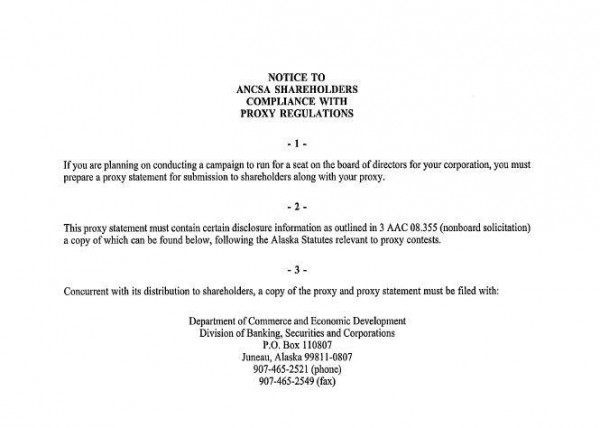The proxy forms mailed out to Alaska Native Corporations’ shareholders could get a little longer next year. The state Division of Banking and Securities is proposing new regulations that would require more information on the proxy solicitations sent to shareholders when they elect board members, and impose a new fee for the corporations.
The state Division of Banking and Securities is proposing new regulations for the Alaska Native corporations under its purview, including requiring additional information on proxy forms and charging the corporations a new fee. The state is currently taking public comment on the possible changes.
As proposed, Bristol Bay Native Corp., Choggiung and 42 other corporations formed under the Alaska Native Claims Settlement Act would be required to disclose more information on their proxy solicitation materials; other smaller corporations are not subject to those state regulations. The information provided must also be filed with the division of banking and securities.
Proxy solicitations are typically sent out as part of the board election process. It’s a written authorization that gives someone permission to vote a person’s shares. Often, they’re sent out by the corporation, and used by the board to vote for the board slate of candidates. The state is also proposing to add information to non-board solicitations of proxies. Shareholders also have the option of direct voting, casting their own vote, based on candidates provided by the board.
But typically, all shareholders receive a proxy, and the state wants that document to be more informative. State banking and securities director Kevin Anselm said the proposed changes developed out of suggestions from the corporations themselves, and a 2012 federal review of the corporations.
“It’s going to give shareholders more information, because the proxy solicitation materials will need to have additional information in them related to the current directors, and for people who are soliciting proxy votes to be elected (to) the board,” she said.
The proposed information includes the number of board and committee meeting attended, other directorships a board member holds, certain financial transactions with the corporation or its subsidiaries, compensation, adverse legal proceedings, and other facts about the leadership structure.
The state has oversight over Native Corporations that have $1 million in assets and 500 shareholders. Right now, the 12 original regional corporations and 32 village corporations meet that threshold.
Bristol Bay Native Corp., Choggiung, and Paug Vik all meet the standard and would be subject to the new regulations. Other Bristol Bay area village corporations such as Igiugig Native Corp., Iliamna Development Corp., and Pedro Bay Corp. do not.
BBNC Vice President and associate general counsel Dan Cheyette said counsel for several regional corporations have been following the issue and have had informal discussions about it.
“Overall, we are supportive of the efforts to make the changes and update the regulations, at least with respect to the proxy requirement,” Cheyette said, noting that BBNC already provides much of the information.
Cheyette said the corporations will suggest some changes to the state on the proxy regulations, and are also asking the state to clarify some of the terms in the regulations, such as adverse legal proceedings and family.
“The whole point of these is to provide shareholders with the relevant information so they can choose the best candidates for the boards,” Cheyette said. “And we don’t necessarily know that everything they’re asking for is needed to do that and will be helpful in doing that.”
Cheyette said the corporations he’s spoken with are more wary of another component of the proposed regulation: a new fee.
The state is asking the corporations under its purview to pay a $250 fee, plus a second fee that could be as much as $25,000, depending on a corporation’s assets, Anselm said.
“It’s a brand new fee,” Anselm said. “There have never been fees paid by the ANCSA corporations for the state administration of this program.”
That would help the state recoup the costs of regulating the corporations, Anselm said.
BBNC and the other regional corporations have the largest assets according to the state’s data, and Cheyette said he has every reason to assume that BBNC would fall at the upper end of the sliding scale fee.
“We think what’s being proposed is unfair,” Cheyette said. “The fees, there’s an annual fee that is proposed to be charged that can very quickly slide up to as much as $25,000 dollars. And to make a long story short, I think they’re basically trying to balance their agency budget on the backs of the ANCs, because I don’t think any of the ANCS get $25,000 worth of services.”
Neither the proxy requirements nor the fees are set in stone. The proposed regulations are out for public comment through Nov. 24. The division will also accept questions through Nov. 13, and provide written responses to those questions.
Cheyette said the corporations plan to comment.
“We’ve had informal talks with the agency all along, we’re going to continue to have those, we’re going to comment, we hope that we can come up with sensible final rules and a fee schedule that works both for the corporations and the agency and it’s an ongoing process,” he said.
After the comment period closes, Anselm said the division will consider the comments and make any changes to the proposed regulations it deems necessary.
Eventually, the final version of the regs will go to the lieutenant governor to sign before they are enacted.
Lt. Gov. Byron Mallott is a former member of the board of directors for Sealaska, Southeast Alaska’s regional corporation. A spokeswoman for the governor’s office said Mallott had not yet reviewed the proposed regulations.
Most likely, the regulations wouldn’t go into effect until 2016.





